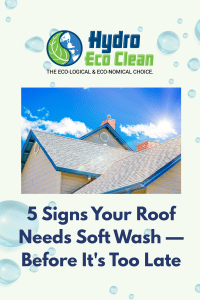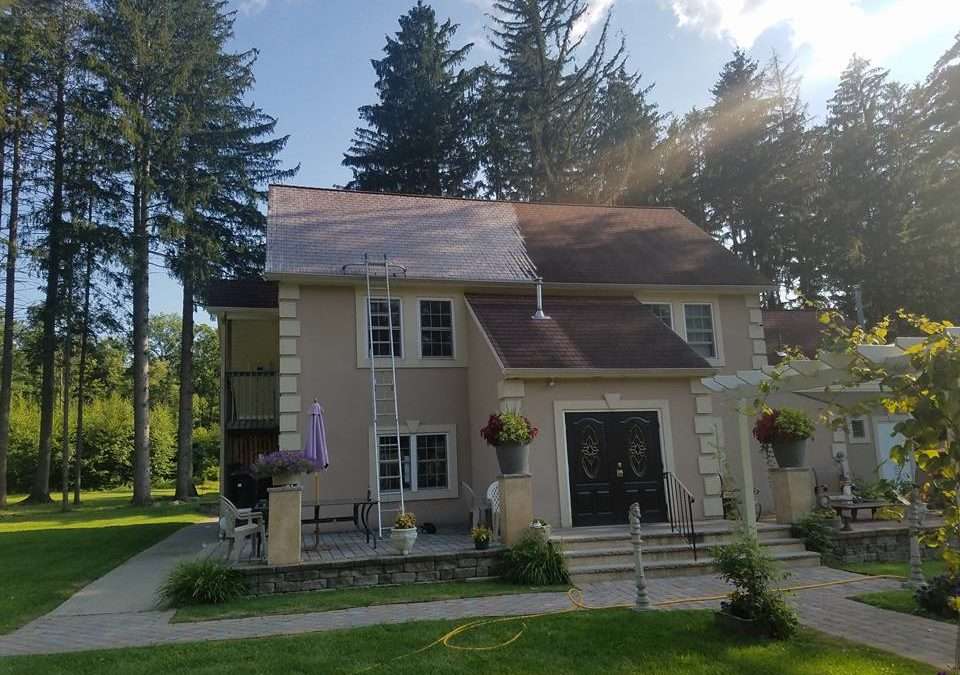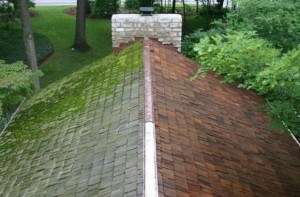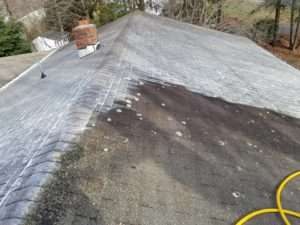Heads up, New Jersey homeowners: If your roof needs soft wash, ignoring the problem can lead to expensive repairs and a shorter roof lifespan!
Many homeowners don’t realize that roof stains and organic growth aren’t just cosmetic issues — they’re warning signs that your roof is under attack. From algae streaks to moss patches, these issues can damage the materials of your roof itself. And if you think you can just blast them away with a high-pressure water hose… think again.
The good news? Soft washing is a safe and extremely effective way to restore your roof without the risks associated with high-pressure washing.
Why Your Roof Needs Soft Wash: Preventing Long-Term Damage
You might not think your home’s roof can get ‘dirty,’ but you’d be wrong! When your roof needs soft wash, it’s usually because of organic growth or stains that have built up over time.
New Jersey’s humid summers, heavy rains, and those random seasonal storms create the perfect conditions for algae, mildew, and moss. Left untreated, these bioorganisms can eat away at shingles, trap moisture, and weaken the structural integrity of your home’s roof.
Unlike traditional pressure washing, which uses high-pressure systems that can strip away granules and damage delicate surfaces, soft wash systems rely on low-pressure water combined with biodegradable cleaning solutions. This method penetrates the root layer of algae and moss, cleaning your roof of dirt and stains while protecting asphalt shingles, tile roofs, and other very delicate materials.
But what about your roof? Here are five unmistakable signs that your roof needs a professional soft wash cleaning.
Sign 1: Black Streaks and Unsightly Stains
Black streaks across your shingles are more than an ugly eyesore — they’re sometimes evidence of algae (unless you know someone shot a bottle rocket over the back patio last summer, then that’s probably ash).
These algae streaks spread quickly and make your home look neglected, but even worse, they break down roofing materials over time.
The worst thing you can do is hit them with a water hose from the top of an extension ladder. High-pressure washing might clear the surface temporarily, but it doesn’t treat the root problem.
A soft wash roof cleaning solution is the preferred method because it targets the organisms directly, restoring clean surfaces and extending the life of your roof.
Our experienced crew delivers dependable power washing in Caldwell, NJ using methods suited to each surface.
Sign 2: Moss and Lichen Growth
If you spot moss or lichen patches, your roof needs a soft wash immediately!
Moss holds moisture against shingles, leading to rot, curling edges, and even leaks. Lichen can dig into surfaces, causing long-term damage.
Spraying with a garden hose or a pressure washer may seem like a quick fix, but these DIY methods risk potential damage to your roof. Plus, this won’t kill the growths at all.
Only professional soft washing treats these organisms thoroughly with eco-friendly cleaning chemicals, leaving your roof clean for extended periods.
Sign 3: Declining Curb Appeal
Your roof is one of the largest exterior surfaces on your home, and one of the most noticeable.
If it looks dirty, stained, or streaked, the entire property suffers in appearance. For homeowners planning to sell, a neglected roof can be a dealbreaker.
Soft washing treats these stains safely, improving curb appeal without harming the roof’s surface.
Unlike power washing, which uses high-pressure water, soft washing is a more effective way to restore a roof’s appearance and enhance the value of your home.
Residents seeking gentle but effective cleaning can rely on our pressure washing services in Saddle River, NJ
Sign 4: Stains Returning Too Quickly
Did you have roof pressure cleaning done recently, only to see the stains reappear within a year? That’s a clear sign the wrong cleaning method was used.
High-pressure washing may clean the roof of dirt, but it doesn’t kill the organic matter that causes discoloration.
The soft washing method, however, uses cleaning solutions that penetrate the surface, ensuring stains don’t come back for a long time. This cleaning process provides effective results that last, saving you both time and money.
Sign 5: Your Roof Shows Patchy Wear or Granule Loss
This isn’t a sign you need a soft wash; it’s a sign you should have gotten one before!
If your roof looks patchy or you notice the granules on asphalt shingles wearing away, soft washing is not the right solution. Granules are a special protective coating that keeps your roof safe from UV damage and water intrusion. Once they’re gone, no cleaning method — not even the gentlest soft wash — can restore them.
At this stage, what you’re seeing isn’t dirt or organic growth, but actual roof wear and tear. A professional roofing contractor should evaluate whether repairs or replacement might be necessary.
That said, regular soft wash roof cleaning earlier in your roof’s lifespan can help prevent the buildup of algae, moss, and stains that speed up shingle deterioration. By keeping the surface clean and free of harmful growth, you can extend your roof’s lifespan and avoid costly repairs and replacements later.
For comprehensive exterior care, we provide trusted pressure washing in Randolph, NJ for residential properties.
Why Soft Washing Works Better Than High-Pressure Washing
New Jersey homeowners often assume that power washing or pressure washing is the most effective way to clean any roof.
However, high-pressure water can strip away protective layers, damage delicate materials like asphalt shingles, and reduce the lifespan of your roof.
The soft washing technique is the go-to solution because it:
- Uses low pressure that’s safe for delicate materials
- Relies on the proper cleaning solutions to kill harmful germs, algae, and moss
- Provides a thorough cleaning process that prevents stains from returning
- Works on multiple surfaces (roofs, siding, gutters, and more)
This eco-friendly way is not just about appearance — it’s about protecting your roof’s surface and extending the life of your home’s most important protective barrier.
Professional vs. DIY: Why You Shouldn’t Go It Alone
It’s tempting to grab a pressure washer and try cleaning your roof yourself.
But without specialized equipment, the right cleaning chemicals, and knowledge of the manufacturer’s instructions, DIY cleaning can really cause more harm than good.
Professional soft washing services, like Hydro Eco Clean, bring:
- Professional gear built for gentle, low-pressure roof cleaning
- Eco-friendly solutions that safely remove algae, moss, and stains
- Hands-on experience working with delicate materials like shingles or cedar shake
- Methods that follow manufacturer guidelines so your roof warranty stays protected
We hate to say it, but DIY attempts with a garden hose, harsh chemicals, or high-pressure methods don’t work. They really just cause you to risk potential damage and won’t provide lasting results.
Roof Maintenance Tips After Soft Washing
Once your roof is cleaned, you’ll want to protect it for the long term. Here are a few tips:
- Schedule soft washing every 2–3 years for regular maintenance
- Pair your roof cleaning with any gutter cleaning to prevent water backup
- Have roof inspections for signs of wear after storms or harsh weather conditions
- Try to avoid walking on the roof, which can cause structural damage
- Always work with a professional roof cleaning service to stay ahead of problems
Regular maintenance routines help homeowners ensure an effective roof cleaning that protects your home’s surfaces for extended periods.
Call Hydro Eco Clean for Professional Roof Cleaning Services
If you’re looking for soft roof washing near me, don’t wait until the damage is irreversible!
Hydro Eco Clean specializes in soft wash systems that protect your roof’s surface, eliminate organic growth, and restore curb appeal in a safe and environmentally friendly manner.
Whether you’re dealing with black streaks, moss, or unsightly stains, our team provides the soft wash solution tailored to your roof’s cleaning needs.
Contact Hydro Eco Clean today for a free estimate and keep your roof clean, safe, and built to last.




